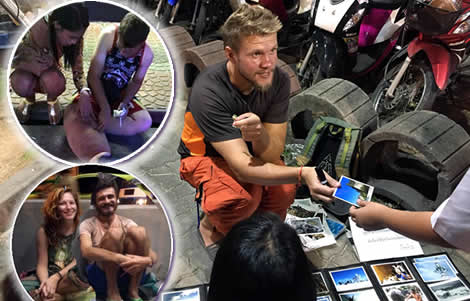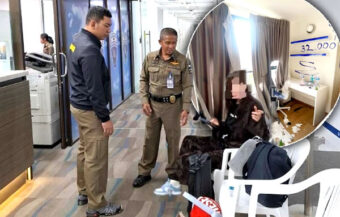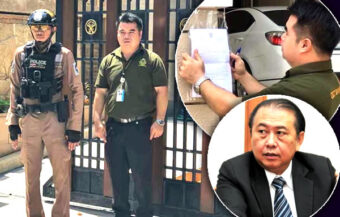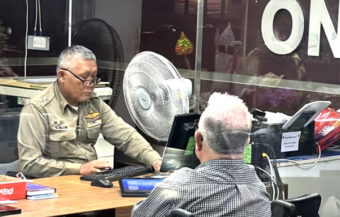The sort of tourists and visitors that Thailand could do without. Cheap, ignorant and entitled begpackers from wealthy western countries are increasingly targeting Thailand as a result of the move in global tourism towards backpacking among millennials and the arrival of the age of Airbnb type thinking.
Thai authorities will have extra powers to deal with begpackers in August when new provisions come into effect for the Thai police following an update to the Beggars Control Act in May this year. The phenomenon of begpacking, where western foreigners from wealthy countries, come to Thailand and expect Thai people to pay for their holidays is both ignorance and in nearly all cases, illegal. Some of the scams involve fraud.
Foreign begpackers face the prospect of time in a Thai jail as new begging laws are due to become effective at the beginning of August in the kingdom.

The problem of beg packing is a growing one in Thailand which authorities are determined to nip in the bud. The activity involves primarily younger adults but some people who are middle-aged from western countries begging for funds and assistance while travelling in Asian countries including Thailand which draws a large number of these hippie type people. Last year, Thai authorities in one quick sweep, detected 81 foreigners begging in key tourist areas of the capital alone.
Law in 2016 allowed Thai police to act against beggars in Thailand and arrest them
Thailand first introduced legislation in 2016 targeting begging on the streets and making it illegal but this move allows the authorities to act against both foreign and local beggars alike. The provisions allow for local beggars to be taken into special custody but also to be fined. There is also the option of a jail term specified at up to 1 month with a maximum fine of ฿10,000.
Trend of western begpacking leaves Thai people more bewildered than outraged
Local people in Thailand have been alternatively touched, bewildered, shocked and outraged by the trend in recent years. This includes observing young western tourists from comparatively wealthy western countries competing with the poorest of the poor in Thailand to sell odds and ends on the side of the roads and imposing themselves on overworked and often stressed out service providers in Thailand such as taxi drivers with requests for free benefits.
Western couples now regularly seen on Thai streets
The last four to five years has seen young western couples on footbridges in Bangkok and other Thai cities smiling bravely with photos and requesting alms and assistance to get them to their next destination or even to go home. The fact that so many photos and videos of such incidents are appearing shows how unexpected and bizarre it appears. For local Thai people who are not politely angered by what they see, there is stupefaction at how the young westerners can deliberately let themselves be exposed to such ridicule and shame. Many of the backpackers, laughingly, are sporting expensive accessories and clothing. All their activities are strictly illegal however and there is evidence that Thai authorities are now gearing up to crack down on the activity and with good reason.
Begpacking activity is a security risk
For one, it is a security risk. Many of these people are also using their new mode of tourism to avoid staying in hotels or normal, established places of accommodation for foreigners. There is an ongoing security drive by Thailand’s immigration police targeting this activity in recent years that has been rigidly enforced. The tough policy has led to the arrest of many foreigners and as well those running illegal hotels and hostelries who fail to report guests.
Growth of Airbnb chimes with this new ‘tourism’
Similarly with hotels and Thailand’s vital hospitality industry. The growth of Airbnb has, to some extent, fitted in well with Thailand’s efforts to develop secondary tourist markets in less developed areas in the country, poorer areas. It has led to an explosion of home accommodation and budget condos being made available to tourists through the internet app and the consequent headache for security agencies in Thailand.
Immigration police in a crackdown on unlicensed accommodation and unregistered guests
Thailand’s immigration police and other security authorities have been working hard to lighten up on the rules governing hotel accommodation which stipulates that only licenced hotels may rent out rooms and that all visitors be recorded and reported as a major security issue.
Erawan Shrine bombing highlighted the security issue
The bombings at the Erawan shrine in 2016 highlighted this need and a strong campaign of enforcement has seen unregistered hotels or establishments renting out rooms on a casual basis closed down and owners arrested, facing prosecution.
Begpackers a result of Thailand’s shift towards targeting the western backpacker market
The patrons of such establishments are often backpackers visiting Thailand on a budget. A market, in fact, that has been deliberately targeted by a switch of emphasis in Thailand’s tourism marketing tactics to attract more younger westerners.
August sees new begging law becoming effective after Beggars Control Act was updated in May
The new legal provisions and orders that target beggars in Thailand become operational in August. This has come about after Thailand’s Beggars Control Act was updated by the government in May. Authorities are determined to clean up Thailand’s streets and key tourist zones from beggars which had seen an increase in activity both in numbers and the degree of canvassing in recent years.
Police can impose heightened fines and sanctions on beggars including taking them into custody
Thai police are authorised to impose fines and other sanctions for repeat offenders caught begging on the streets and in public places. They can remove and move on those breaking the law from public spaces. Although initially, the fines will be modest starting at ฿500, authorities will later have the power to impose more substantial fines for repeated activity. These fines can reach ฿10,000 and those involved in the activity can be sent to life development centres. It is, in fact, a mild form of imprisonment. Those sent to such institutions will not be able to leave without permission.
Thai taxi driver thought he had spotted a good fare to Kanchanaburi but they wanted a free ride
Thai social media was recently perplexed when a hard-working taxi driver on the mean streets of Thailand spotted a couple of western tourists holding a cardboard sign which said Kanchanaburi in western Thailand. The taxi driver slowed down hopeful of a bumper fare to be greeted with the words ‘No money’. The taxi driver not surprisingly drove on.
An invitation to a hard-working Thai man to use his car, petrol and time to drive two entitled young western people around Thailand for free
The Thai taxi man was more bemused than annoyed by the invitation from the two westerners that he should accept a long zero income fare using his own car, petrol and time to transport two young western people to their destination. Perhaps he would have been if he had the time to think about it or if he realised that the audacious and unreasonable invitation was real.
Simply incomprehensible to Thai people
Such a proposition is simply incomprehensive to a hard-working Thai person working within a competitive economy. If the taxi driver did have time to think about, then he would have every reason to be angry. It simply the height of entitlement and disrespect to other human beings, real people in another culture and country trying to make a living. It is ignorance.
Immigration officer now probing financial means of some incoming visitors at airports
The growth in foreigners and quite noticeably, young white westerners, engaged in begging and canvassing Thai locals for money has become an issue in Thailand. In recent years, Thailand’s authorities have made moves to bring it under control. One of these is an increase in probing questions by immigration officers on arrival for those visiting the country as to their financial capability for the trip. It is suggested that any visitor to Thailand should have at least ฿20,000 to spend if entering the country.
Begging on the streets is illegal in Thailand
Westerners should realise that all forms of begpacking in Thailand are strictly illegal. Under the Thai Beggars Control Act, passed in 2016, which has now been updated by Thai authorities in May this year, begging is illegal in Thailand and those engaged in the activity face action by the police.
Busking and music-making for money is a violation of strict labour and immigration laws
Similarly, busking is illegal in Thailand as it is a breach of Thailand’s labour and immigration laws. No musician who is an alien, may perform in Thailand without the appropriate visas and permits from authorities being issued. Also, foreigners selling trinkets or any product whatsoever on the street it is a violation of Thailand’s Alien Employment Act. It is a prohibited labour activity denied to foreigners. Such matters are quite important in Thailand.
Ignorant, ‘cool’ trend continues
Despite this, this ignorance is now a ‘cool’ trend among hip young millennials some of whom continue to come to Thailand. The activities are insulting to the occupations of Thai men and women as well as their right to a livelihood in their own country, something many of these young people have no understanding of apparently. It also, inherently, deeply disrespectful to the laws of the kingdom.
Western woman with a baby abandoned by her husband appeals to the hearts of Thai people
It even gets worse. A western woman appears with a young baby on the streets of Thailand. Her story is a shocking one. She has been abandoned by her husband and left to her own devices in a foreign country and culture. She pleads with kind-hearted Thai people who anxiously enquire about her predicament, to give her donations. Many do.
Fraud, pure and simple
The next day she is back at the same spot. This time she is with a man. Her husband has miraculously returned and now her story is that the family is stranded in Thailand. They need funds to get out of the country. This is not begging. This is fraud pure and simple and that couple should be jailed. It is time for an example to be made.
Begpacking chimes with the age of Airbnb
The phenomenon of beg packing chimes with a range of other activities associated with a small minority of young millennials travelling to Thailand in recent years. Most are young men and women, it must be said, of exemplary conduct. The sheer numbers mean that there are, however, always going to be a growing number of entitled young westerners turning up in the land of smiles. Even the prostitutes in Bangkok, Pattaya and Phuket are now reporting Brits, Americans and Europeans who want to take them out for good time but refuse to pay for sex as a matter of principle. This, it is reported, is not going down well at all.
Crowdfunding, a resource for western tourists in Thailand when things go wrong
A similar phenomenon can be seen in crowd funding exercises for western tourists, often young people seeking financial support from a sympathetically galvanised community at a time of peril being faced by foreigners visiting Thailand. In most cases, it is used for genuine mishaps and hospital expenses.
Crowdfunding to hire a Thai lawyer after being arrested in Chiang Mai for theft of a phone
However, of late, the funding method has shown itself to be open to a range of other uses. This year, a 29-year-old UK man from Dorset in Southern England used crowdfunding to hire a Thai lawyer to settle a charge of theft while he was arrested and incarcerated in Chiang Mai Prison. He was later released and the case, which involved the theft of a smartphone at Chiang Mai Airport from a German tourist, was dropped through the use of Thai legal provisions by the prosecutor in the case.
Thai police say young UK man was guilty
Thai police, however, later released strong evidence to show that the young man was guilty and had simply bought his way out of the charge using crowdsourced funds. Thai law provides for discretion on whether to prosecute in such cases where a financial settlement is made. The young man, Mr Chris Dodd, returned to the UK and told a TV audience on how he dealt with imprisonment in Chiang Mai prison where he saw his dreadlocks sheared off as he was lodged in that institution after being charged by police based on the evidence before them.
I hate Thailand – a video that explores a genuine and positive experience when things go wrong
A viral video published by Thailand’s tourism authorities in 2014 was entitled ‘I Hate Thailand’ and the video highlighted a foreigner who experiences a nightmare in Thailand when his bag and wallet go missing after an outdoors, all-night party. The charming video shows how an irate and intemperate foreigner is helped by local Thai people who are genuine, forbearing and caring. The video has some basis in truth.
Bad news sells, good news doesn’t unfortunately
Many column inches of newsprint have been dedicated to scams and the rip off of tourist by some unscrupulous Thai people and much worse. Bad news sells, good news not so much, unfortunately. The problem with begpacking is that it takes advantage of what is real goodwill towards westerners which exists in Thailand. It poisons the well for genuine foreigners when they do, in fact, find themselves in difficult situations where local help is appropriate.
Incidents of begpacking range from fraud to outright ignorance and law-breaking
Incidents of begpacking have been reported from all over Thailand. They range from our example here of fraud and the obtaining of money under devious and false pretences to simply disregarding or deprecating hard-working Thai people’s inherent right to livelihood in their own country.
Liberal UK Independent newspaper tried to muddy the waters in 2017 raising the issue of busking
An article in the liberal and hip UK Independent newspaper of London in April 2017 did not attempt to justify begpacking. It is wrong and indefensible from any point of view. It did, however, try to muddy the waters by suggesting that busking was a legitimate way to travel around the world. This might be so in some countries but in Thailand, it is not. It is simply and clearly illegal under Thai labour law.
One of Thailand’s most famous begpackers is a hated man for his dishonest campaign of self pity
One of Thailand’s most famous begpackers is cripple. A cripple who has become, at least among the growing community of foreigners in Thailand, one of the most hated men in the world. His name is Benjamin Holst. The German man suffers from a chronic condition known as macrodystrophia lipomatosa. This has left him with an ugly looking and quite grotesque swollen left leg. The German became a fixture in Thailand’s streets begging for money and moving about the kingdom. That is until last year when a German organisation came to his rescue.
Good Germans in Thailand raised ฿50,000 for Benjamin Holst to be sent home from his plight
He told his German friends that he was without a passport and the necessary funds to return home to Germany. A cripple left at the side and mercy of the mean streets of Thailand. His situation touched the hearts of his German compatriots who got together and raised funds for a new passport and plane ticket home for Benjamin. It is reported that the German man received a sum of ฿50,000.
Begpacker celebrated in Pattaya with prostitutes
Within 24 hours, the outcome was not quite the happy reunion with friends and family in the mother country that his rescuers had perhaps expected. Photos emerged online and in the media of Mr Holst celebrating his newfound good fortune with friends and prostitutes in Pattaya.
After a brief return to Europe, it is now reported that Mr Benjamin Holst has resumed his begpacking days in the Philippines where news about him has surfaced in Angeles City in Pampanga province. He was photographed living it up with some sexy new friends in a jacuzzi. It appears begpacking indeed has its moments.
https://www.facebook.com/thaiexaminer/videos/364325537600630/


















